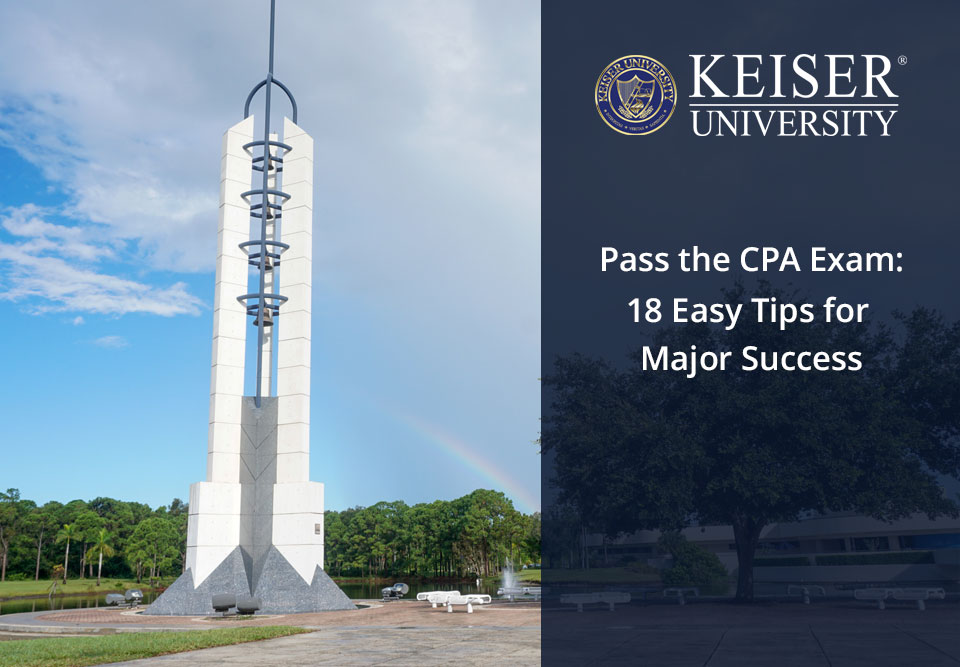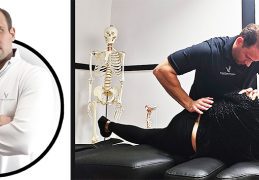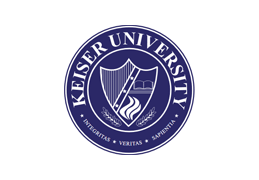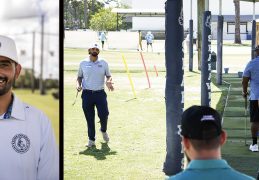Every state in America requires a passing score on the CPA exam for those seeking work as a certified public accountant. It’s an important exam – but it’s not easy to pass. According to the National Association of State Boards of Accountancy (NASBA), it’s a 16-hour, computer-based test that’s comprised of four sections, including:
- Regulation
- Business Environment and Concepts
- Financial Accounting and Reporting
- Auditing and Attestation
The exam uses a variety of formats, including multiple-choice questions, written communications tasks and task-based simulations. You’ll need a comprehensive knowledge of accounting principles to score a passing grade, though it’s good to note that you’re not expected to complete all 16 hours of the exam in one sitting. You can schedule each exam section ahead of time in separate sessions.
If you’re new to your accounting degree and worried about how to study for the CPA exam, we’ve put together this informative guide to help you prepare. Knowledge is power, and the more informed you are regarding what’s on the test and what to expect before, during and after the testing process, the more confident you’ll feel when the day arrives. These CPA exam tips and tricks should help.
How to Study for the CPA: General Tips
1. Get Plenty of Rest
You’ve heard this advice all your life, but it has never been more important than it will be in the days leading up to your CPA exam. Depriving yourself of sufficient sleep can shorten your attention span, cause your focus to drift and create gaps in your memory. It can give you a headache on the day of the big test, and it can make a four-hour session feel more like four days.
If you feel you must cram in the weeks leading up to the test, make sure you ease off with at least a week to spare. Take this time to straighten out your nighttime routine and get back in the groove of sleeping for at least eight hours a night.
2. Balance Studying and Personal Life
College requires some sacrifice, and so does studying to get a passing score on your CPA exam. In the weeks leading up to your state board exam, try to minimize distractions. Make friends and family aware of the importance of what you’re doing and how difficult you expect the exam content to be. Limit the time you spend away from home and set aside dedicated time each night for study.
3. Don’t Be Afraid to Ask for Help
The people who care about you the most want you to succeed. And while it may be difficult to admit you need help, you’d be surprised at the many ways others can come through for you during this stressful time. Friends and family can help in various ways, including:
- Becoming your dedicated study buddy
- Including you in their established study group
- Setting up a quiet area in their home for you to hit the books
- Doing your grocery shopping
- Bringing you pre-made meals
- Making sure you get a bit of healthy downtime away from your accounting notes
4. Limit Distractions While Preparing and Studying
You have the option of deciding when you’ll take each exam section. Therefore, choose the times that are most convenient for you. This means avoiding those weeks when you might already be stressed by work or school or when other stressors, such as demands from family or friends, may cause you to feel distracted or less than focused on studying.
5. Determine Your Goals for the Exam
Remember, you don’t need a perfect score on your exam to become a certified public accountant – you only need a score of 75. A lot goes into scoring the different exam sections. You can learn more about the finer points of exam scoring from the Association of International Certified Public Accountants.
6. Have Confidence in Your Abilities
Your confidence level on test day will factor in to how well you perform. To this end, make sure you’re prepared, well-rested and have eaten a healthy breakfast before sitting down to take your test. And remember that your best is more than good enough to pass your exam.
7. Limit Procrastination
If you’re someone who is prone to procrastination, there are several good methods of overcoming your penchant for putting things off. Try a mobile app that doles out small rewards every time you reach a study goal, or enlist an accountability partner to help you buckle down and dig in. Break your study sessions down into small, manageable segments of time, and stick to your study goals for each session.
8. Prioritize Your Mental Health and Stress Levels
Giving in to panic may contribute to burnout before the big day. So set goals that are manageable and achievable – and make plenty of time for relaxation. Try stress-relieving activities such as meditation, mindfulness or yoga to help you regain your inner peace.
9. Understand There Will Be Hard Questions and That It Is Okay to Get Questions Wrong
Setting standards for yourself that are too strict is another way to induce burnout. When you sit down to take your state board test on exam day, remember that nobody is perfect. And you don’t have to be perfect, either. All you need is a passing score. Nobody expects you to get every answer right, and neither should you.
How to Start Studying for the CPA: Tips and Tricks
10. Take Practice Exams
Sample tests can be found on the website of AICPA-CIMA. They’ll familiarize you with the testing format and type of questions you’re likely to encounter, including answers to each question so you can check your own work.
11. Ask Others How They Prepared for the Exam
Find local professionals who’ve taken the test and tap them for pointers. Ask friends and family members if they can set up a time for you to talk with their own accountants.
12. Find a Quiet Study Area
Study away from noise and distraction. If your home is too full of roommates or family, try the library, outside or even in your car.
13. Break Up Your Studying
Set realistic goals for study sessions. Studying for an hour, five times a week is better than trying to stay focused for five hours straight on Sunday night. You might also consider taking notes with you wherever you go. Then, if you’re ever stuck waiting in line, you can pull out your notes and get in a quick study session.
14. Learn and Practice the Different Types of Exam Questions
Practice makes perfect. The more you familiarize yourself with sample exam content, the more confident you’ll feel on test day. To this end, it will be beneficial to take as many practice tests as possible. Other media can help too. Books, flashcards and software are available that will help you prepare to earn a passing score.
15. Review the Exam Structure
Read up on how the exam will be administered and know the rules regarding breaks. If you have a good idea of what to expect on the big day, it will help everything go more smoothly.
16. Understand How the Exam Is Scored
Scoring on the CPA exam is a bit complicated, with different weights being given to different question categories. Familiarize yourself with how much each type of answer is worth on each section of the test to gain a better understanding of how your results will be scored.
17. Utilize Online Exam Prep and Help
There are many free online resources you can use to help you prepare to take the certified public accountant exam. They include:
- AICPA-CIMA
- The Georgia Society of Certified Public Accountants
- Texas Society of Certified Public Accountants
- Kentucky Board of Accountancy
- AccountingEdu.org
18. Review Past Exams
If you take and fail an exam section, don’t panic. This happens to many people. The good news is that you can use this as a learning opportunity. You’ll automatically receive a Candidate Performance Report letter that assesses your performance on the test. Review it to see where your strong points are and which areas require additional practice.
How Long Does It Take to Study for the CPA: Organization and Planning
There’s no right or wrong amount of time to study for your certified public accountant test. But if you stay organized and stick to your study routine, you’ll arrive at your goal in a more orderly fashion. Test Prep Insight recommends roughly 80 to 100 hours of study for each exam section. You may be able to shave valuable time off this estimate by following a few basic tips:
- Create an overall study calendar/plan and stick to it
- Use flashcards or other study tools
- Stay true to how you study
- Join a study group
- Break down sections of the exam into separate areas to study
- Give yourself plenty of time
- Develop strong time management skills
Earn your Accounting Master’s With Keiser!
Keiser University Graduate School is ready to help you achieve your goal of gaining licensure as a certified public accountant. In fact, we offer a full range of specialist, master’s, certificate and doctoral programs for you to explore, many of them fully online.
When you’re ready to continue your education and earn your Master of Accountancy or your Master of Business Administration in Accounting, Keiser University Graduate School is ready to answer any questions you may have. Along with online educational opportunities, we feature small class sizes and a personalized level of instruction you won’t find anywhere else. Contact a graduate admissions advisor today for more information!






 The instructors at Keiser University impacted my life. They believed in my ability to become a great graphic designer, regardless of how I felt about my skills. KU helped to prepare me for the real world and got me to where I am today.
The instructors at Keiser University impacted my life. They believed in my ability to become a great graphic designer, regardless of how I felt about my skills. KU helped to prepare me for the real world and got me to where I am today.
